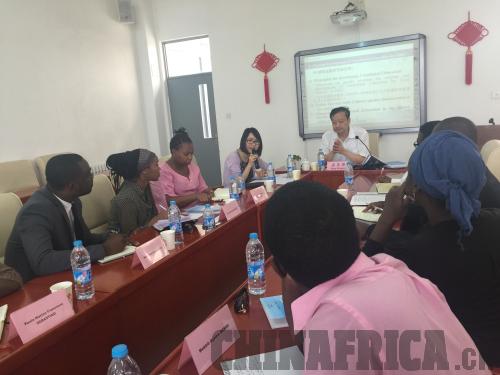| 
African students and their master Lang Rongbiao
During the last week of June in the sweltering heat of Tianjin City, while most Chinese students could hardly wait for their summer vacation to begin, 11-year-old Mambwe Bwalya was instead getting excited about his first day in a new school which, of course, teaches neither math nor physics, but helps to realize his kungfu dream.
Huo Yuanjia Cultural and Martial Arts School, named after a renowned martial arts master in the 19th century China and located in his birthplace of Tianjin, is famous for producing many martial arts champions. Under its strict military discipline, Bwalya will receive a tailored training program at the school during the upcoming three-month semester.
How did a Zambian boy show up in a kungfu school in China? "Because I'm one of the best in my country," Bwalya answered quickly.
That is true. The boy and his classmates - 19 Africans of different ages - are selected from the top martial arts practitioners in Ethiopia, South Africa, Mauritius, Zambia and Nigeria.
Furthermore, they appeared in the Chinese school because China is adopting a new pattern for its cultural promotion that aims at enhancing its cultural ties with African countries. According to the Chinese Ministry of Culture, hundreds of Africans from all walks of life have received cultural and vocational training in Chinese organizations and institutions in the past three years through the cultural exchange programs organized by the ministry.
Over the past few decades, China's effort to establish cultural communication with other countries has been centered on sending Chinese artists to perform overseas. The Ministry of Culture has been one of the most important partners of the countries' top art troupes, which takes the opportunity to earn international fame while promoting Chinese culture to a different continent. Tianjin Peking Opera troupe, for example, entered the theater in South Africa in June through the Year of China in South Africa.
Throughout the year of 2015, according to the Ministry of Culture's budget, over 20 million yuan ($3 million) will be spent on cultural exchange activities with other countries. However, the ministry has decided the money should be spent in a more effective and meaningful way, especially when it comes to exchanges with African countries.

A seminar at the Tianjin University of Technology and Education
"We shift our focus from overseas performance to human resources training, because it matches up to the current needs of African countries," said Song Yanqun, an official in charge of African Affairs of the Bureau for External Cultural Relations of the Ministry of Culture, adding "African countries are, in general, in the process of developing. What developing countries need most are talents."
So far, four training centers designed for Africans have been set up and have provided training programs on martial arts, cartoon production, ceramic art, embroidery, relic restoration and museum management to professionals from different African countries.
Practicability is key when planning content for teaching, said Huang Yun, an official from Zhejiang Provincial Cultural Center. The center has provided training classes of embroidery and bamboo braiding to African craftsmen for two consecutive years. In addition to design and innovation, Huang said, they hope to focus teaching on the products that can be commercialized and they compiled an English textbook to help the African artisans train their own people back home.
"It's a win-win strategy," said Song. "[From the programs] Africans can learn skills that can help improve their lives, and meanwhile, it's an opportunity for us to help them learn more about Chinese culture."
In June, Kyerefwie Osei from Ghana participated in a 10-day seminar, organized by the Tianjin University of Technology and Education for young professionals from the African Union. During the 10 days, she was exposed to China and Chinese culture for the first time in her life, learning from the lectures given by Chinese professors and by visiting local historic sites and museums.
China's new education system and efforts in vocational training were impressive, said Osei, but what enlightened her most was the importance of culture in China as a tool, which made herself realize "how we [as AU officers] could use preservation of our culture to engage with other countries and further engage with China, and to create a better exchange … between China and Africa."
On June 25, Osei received her training certificate. On the same day, on the other side of the city, Bwalya attended a speech by his head teacher at the school's opening ceremony.
Three months is too short for any serious martial arts training, Lang Rongbiao insisted. As the founder of Huo Yuanjia School, the former martial arts champion has previously welcomed three separate batches of African students. The previous experience has made him more confident about the task.
The goal of the training, Lang said, is to help the students master several routines that they can continue to practice in their own country and be able to teach it to more local students.
Now one of the former students has achieved this by founding a martial arts school at home. And Bwalya believes he will become a kungfu teacher someday. |